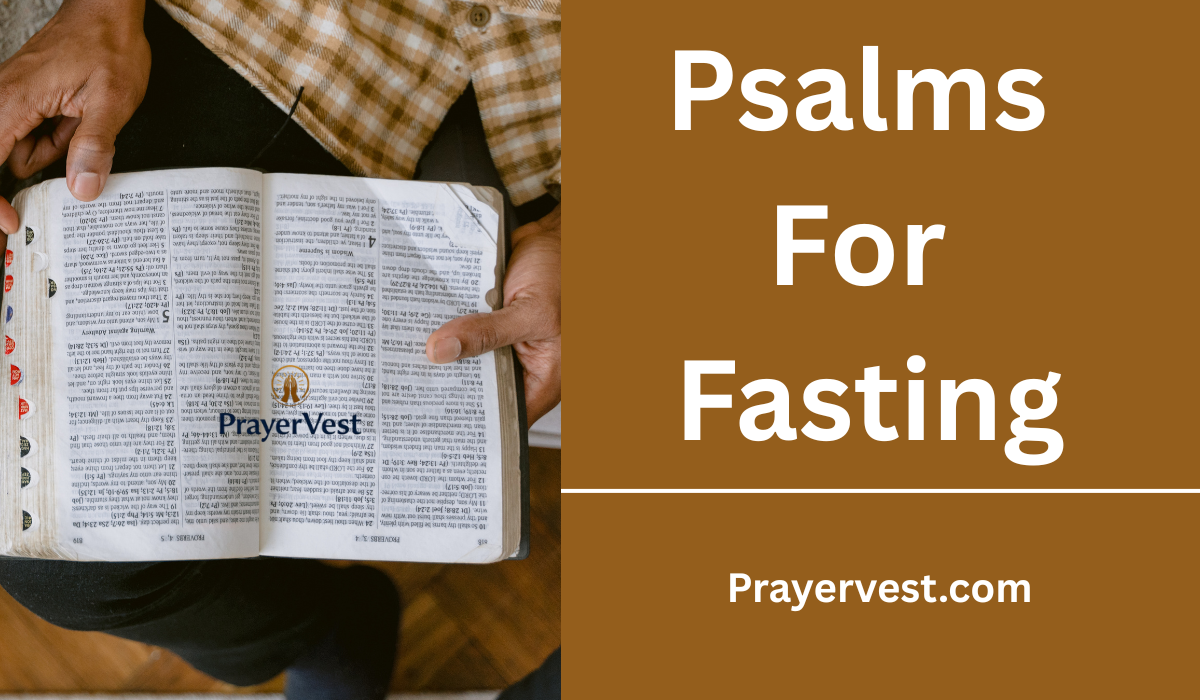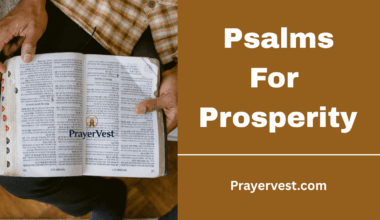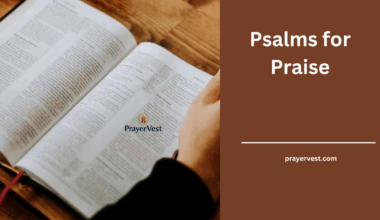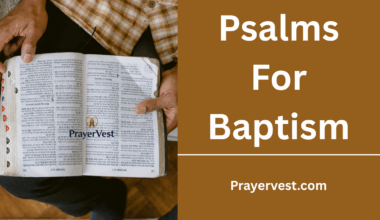Psalms for Fasting is a spiritual discipline based on humility, reliance on God, and a strong desire for His presence. It goes beyond simply abstaining from food. Fasting is a holy practice that is frequently combined with prayer, repentance, and worship throughout the Bible.
The book of Psalms provides significant statements that reflect the spiritual experience of fasting because of their unvarnished honesty and intense emotion. The Psalms for Fasting offers the words and attitude of the heart for anybody seeking God during a time of fasting, whether they are looking for forgiveness, direction, strength, or a closer relationship with the Lord.
The soul frequently becomes more sensitive to comfort and conviction during periods of fasting. The entire range of this spiritual vulnerability—sin confession, desire for righteousness, faith in God’s provision, and praise that blossoms even in suffering—is expressed in the Psalms.
In times of spiritual need and hardship, David and other psalmists poured out their souls; many of these experiences are very similar to those of people fasting today. These holy melodies teach us to let go of our troubles and get closer to the God who fills our voids.


These Psalms can help you focus and direct your prayers when you begin a fast, whether it’s for a personal breakthrough, intercession, or heavenly clarity. Every verse calls for a holy pause—a time to think, to confess your sins, to realign your heart with God’s will. By fasting, we purge ourselves so that God’s fullness can fill us. The Psalms become a companion in this spiritual dialogue, strengthening our faith, igniting our devotion, and exalting the One who satisfies our deepest longing.
50 Powerful Psalms For Fasting (2026)
1. Psalm 35:13
“Yet when they were ill, I put on sackcloth and humbled myself with fasting. When my prayers returned to me unanswered…”
David recalls a time when he fasted not for himself, but on behalf of others. His fasting was accompanied by humility and sorrow, even for his enemies. This verse emphasizes the intercessory power of fasting—a sacrificial act that aligns us with God’s mercy on behalf of others. David’s example reveals that fasting is not only personal but can be a powerful expression of love and spiritual empathy.
Reflection
Fasting isn’t always about asking for something—it can be a profound way of standing in the gap for someone else. It softens the heart and creates space for deep compassion to grow. When we deny ourselves in fasting, we begin to feel a sliver of the burden others carry. This empathy moves us to pray fervently. Even when prayers seem to go unanswered, fasting helps align our hearts with God’s will and His timing, reminding us that true love bears spiritual burdens with patience and humility.
2. Psalm 69:10
“When I wept and humbled my soul with fasting, it became my reproach.”
David expresses the pain and ridicule he endured while seeking God through fasting and tears. Rather than being honored, his sincerity was mocked. Yet this verse shows the depth of his devotion: fasting was a form of heartfelt worship, not public performance. It was a posture of brokenness before God, regardless of what others thought.
Reflection
Fasting can feel lonely. When you choose to humble yourself and seek God in secret, the world may misunderstand, criticize, or ignore your sacrifice. But God sees it all. He honors the heart that fasts not for praise or recognition, but out of desperate longing for Him. True fasting strips away the noise of human validation and draws us into intimacy with the only One whose approval truly matters. In those quiet, hungry moments, God meets us with sustaining grace.
3. Psalm 109:24
“My knees give way from fasting; my body is thin and gaunt.”
David vividly describes the physical toll of prolonged fasting, highlighting his weakened state. This honest portrayal reminds us that fasting is not merely a spiritual metaphor—it is an embodied discipline that tests both body and spirit. His weakness, however, also becomes a testimony of devotion, as he lays everything before God, even his strength.
Reflection
There’s a sacred beauty in weakness when it’s offered to God. Fasting empties us physically so we can be filled spiritually. It teaches dependence, strips pride, and quiets our hunger for worldly things. When we are brought low, when our knees tremble and strength fades, that’s where God’s power begins to move. Our desperation becomes our offering, and our feebleness becomes the doorway to divine strength.
4. Psalm 126:5
“Those who sow with tears will reap with songs of joy.”
While not explicitly about fasting, this verse captures the essence of spiritual discipline. Fasting, often accompanied by tears, is a kind of sowing—planting seeds of prayer, repentance, and yearning. The promise is that such labor, though painful, is not in vain. Joy is coming. Harvest will follow hunger.
Reflection
Fasting often feels like planting seeds in dry soil, with no immediate signs of growth. But God is not blind to your sacrifice. Every tear you shed, every craving you surrender, every whispered prayer in the silence—He gathers them all. In due time, those seeds will bloom into joy. Fasting teaches us to wait with holy expectation, to trust that the God who sees in secret will reward in full. What begins in brokenness can end in breakthrough.
5. Psalm 51:17
“My sacrifice, O God, is a broken spirit; a broken and contrite heart you, God, will not despise.”
This verse captures the heart of fasting: humility, repentance, and surrender. In Psalm 51, David confesses his sin with a heart shattered by guilt. Instead of burnt offerings, he offers his brokenness—a deeper and truer sacrifice. Fasting, paired with a contrite heart, becomes an altar where we lay ourselves before God.
Reflection
When we fast, it’s not about proving something to God but about opening ourselves to Him completely. A broken heart may seem like a weakness, but in God’s eyes, it’s a holy gift. Fasting allows us to quiet the distractions, confront our own sin honestly, and invite God to do a deep work of restoration. His grace meets us not in our strength, but in our sincere surrender. In the ashes of repentance, new life begins.
6. Psalm 6:6
“I am worn out from my groaning. All night long I flood my bed with weeping and drench my couch with tears.”
David’s pain runs so deep that it pours out through the night in tears and exhaustion. This verse speaks to the intensity of spiritual and emotional anguish—something often expressed during times of fasting and soul-searching. His groaning is not just emotional; it is a cry for divine intervention.
Reflection
Fasting has a way of exposing the raw places in our hearts. It takes us beyond surface prayers into the deep waters of vulnerability. There are seasons when our hunger is not just physical, but spiritual—we ache for answers, relief, or healing. In those moments, our tears are our prayers. God is not distant from that pain; He is present, listening, and responding in ways unseen. Let your sorrow lead you to sacred surrender.
7. Psalm 30:11
“You turned my wailing into dancing; you removed my sackcloth and clothed me with joy…”
Sackcloth, often worn during fasting and mourning, symbolized grief and repentance. This verse beautifully depicts the transformation God brings—turning sorrow into celebration. The time of fasting gives way to a time of rejoicing, revealing God’s redemptive power to heal what was once broken.
Reflection
Fasting is often marked by sorrow, but it is never meant to end there. God doesn’t leave us in our grief. As we seek Him with humility, He moves us from lament to liberation. There is a time to weep and a time to dance, and those who fast in faith will one day experience the joy of divine restoration. Your sorrow is a season, not a sentence. Hold on—joy is coming.
8. Psalm 40:1
“I waited patiently for the Lord; he turned to me and heard my cry.”
Fasting teaches us to wait—to be still and trust. This verse reflects the fruit of that kind of perseverance. David waited, cried out, and was heard. Fasting is often a cry of the soul—a waiting in faith for God’s answer, presence, or breakthrough.
Reflection
Patience and fasting go hand in hand. We empty ourselves not to demand from God but to position ourselves to hear Him better. It’s not about how long we fast, but how deeply we wait. When we cry out in faith, heaven listens. The God who sees in secret bends low to hear the whispers of the humble. In fasting, you may feel empty, but that is the very place where God’s voice often speaks the loudest.
9. Psalm 143:6
“I spread out my hands to you; I thirst for you like a parched land.”
This verse paints a vivid picture of spiritual longing. Just as fasting reveals our physical hunger, it also surfaces our deepest thirst for God. The psalmist reaches out with desperation, knowing that only God can satisfy his soul.
Reflection
Fasting exposes our dependence. In the absence of food, we realize how little control we truly have—and how much we need God. Like dry land waiting for rain, our souls wait for His presence. This posture of surrender, hands outstretched and spirit humbled, is the essence of a fast. We don’t fast to twist God’s hand—we fast to reach for His heart. And the good news? He always responds to the thirsty.
10. Psalm 119:20
“My soul is consumed with longing for your laws at all times.”
This verse captures the essence of spiritual hunger. During fasting, the absence of food sharpens our awareness of what we truly desire—and for the psalmist, that desire is God’s Word. Fasting reorders our cravings, turning our hearts back to divine truth.
Reflection
What consumes you? When you fast, what rises to the surface? This verse invites us to long not just for relief or blessings, but for God’s Word to fill us. Fasting is a holy hunger, an invitation to crave things eternal over things temporary. When we deny our flesh, we feed our spirit. And in doing so, we find a deeper satisfaction that food could never provide.
11. Psalm 10:17
“You, Lord, hear the desire of the afflicted; you encourage them, and you listen to their cry.”
This verse assures us that God hears the longings of the afflicted. Fasting often brings us to a place of spiritual affliction—a yearning born from desperation. The psalmist’s confidence reminds us that our cries during fasting are never ignored by the Lord.
Reflection
When we fast, our prayers become more fervent, our needs more pronounced. In this sacred hunger, we find assurance: God listens. Not only does He hear our cries, but He encourages us in our weakness. In seasons of affliction, fasting becomes a conduit for God’s comfort. Let this truth steady your heart—your whispers of pain are not lost in silence but caught in the ears of the Almighty.
12. Psalm 63:1
“You, God, are my God, earnestly I seek you; I thirst for you, my whole being longs for you, in a dry and parched land where there is no water.”
David describes an intense spiritual thirst, one that mirrors the physical sensations we experience during fasting. He acknowledges a deep longing that only God can quench, especially in spiritually barren seasons.
Reflection
Fasting leads us into the wilderness, where all distractions are stripped away. It is here, in the dry places, that we begin to hunger and thirst for what truly satisfies. David’s prayer becomes our own: “God, I need You more than anything.” In fasting, we don’t just endure emptiness—we discover how to be filled with the presence of the Living God. This verse reminds us that divine thirst always leads to divine encounter.
13. Psalm 42:2
“My soul thirsts for God, for the living God. When can I go and meet with God?”
This verse expresses a deep desire for communion with God. Fasting is often undertaken with this very intent—to draw near and experience the presence of the living God. It reflects a holy dissatisfaction with the world and a longing for divine intimacy.
Reflection
In fasting, our soul learns to crave God more deeply. It awakens us to our spiritual thirst and propels us toward the only One who satisfies. David’s longing to meet with God echoes the heart of every fasting believer. When we fast with expectation, we position ourselves for a divine encounter. Let your hunger point you to the God who is not only alive but waiting to meet with you.
14. Psalm 86:11
“Teach me your way, Lord, that I may rely on your faithfulness; give me an undivided heart, that I may fear your name.”
Fasting helps us examine our inner life, exposing areas of distraction or disloyalty. This verse reflects a cry for spiritual alignment—an undivided heart that is wholly devoted to God. Fasting becomes a tool for cultivating that kind of singular focus.
Reflection
A divided heart cannot fully seek God. Fasting offers the space to quiet competing voices and center our attention on Him alone. In that stillness, we invite God to reorder our affections and teach us His ways. Ask God to unite your heart in devotion. Through fasting, the soul is trained to trust in God’s faithfulness and revere His name with renewed awe.
15. Psalm 119:147
“I rise before dawn and cry for help; I have put my hope in your word.”
This verse shows a commitment to early, intentional prayer—a practice often intensified during fasting. The psalmist links his cries for help with trust in God’s Word, embodying a fast that is grounded in hope, not just desperation.
Reflection
Fasting sharpens the urgency of our prayers. We rise early, seek God eagerly, and cling to His promises as our sustenance. Hope anchors us even in physical weakness. When you fast, let the Word be your food and your prayers the cry of a hungry heart. The God you seek in the early hours is already listening.
16. Psalm 25:9
“He guides the humble in what is right and teaches them his way.”
Fasting humbles us. It reminds us of our frailty and invites us to surrender control. This verse assures that in our humility, God becomes our guide, revealing His ways to those who seek Him in lowliness and trust.
Reflection
True fasting is not just about abstaining—it’s about yielding. As we empty ourselves, we create space for God’s voice. The humble heart is teachable, and fasting places us at the feet of the Master. In every hunger pang, we learn again that His guidance is better than our striving. Ask not just for answers during your fast, but for the grace to walk in His way.
17. Psalm 27:4
“One thing I ask from the Lord, this only do I seek: that I may dwell in the house of the Lord all the days of my life…”
In fasting, we often seek many things: breakthrough, healing, direction. But David reminds us that the highest pursuit is simply God’s presence. Above all else, to dwell with Him is the deepest desire of the fasting soul.
Reflection
What is your one thing? Fasting reorients our priorities, showing us that the greatest reward is not what God gives, but who He is. David’s longing to dwell with the Lord reveals the purest motive for a fast: communion. When the hunger fades and the prayers have been prayed, may the presence of God be your greatest satisfaction.
18. Psalm 130:5
“I wait for the Lord, my whole being waits, and in his word I put my hope.”
Fasting involves waiting—sometimes in silence, sometimes in desperation. This verse mirrors the posture of those who fast: expectant, surrendered, and grounded in God’s Word.
Reflection
Waiting is rarely easy, but it is often where transformation happens. Fasting trains our hearts to wait with hope, not frustration. It reminds us that delay is not denial, and silence is not absence. As you fast, don’t just wait for results—wait for the Lord. Fix your eyes on His Word, and trust that He is moving even when you cannot yet see.
19. Psalm 141:2
“May my prayer be set before you like incense; may the lifting up of my hands be like the evening sacrifice.”
This verse draws a connection between prayer and worship. During fasting, our prayers become like incense, rising to God with purity and purpose. The lifting of hands, like a sacrifice, reflects a heart surrendered.
Reflection
Fasting is a spiritual offering. Every hunger pang is a fragrant act of worship, every whispered prayer a sacred aroma rising to God. Your fast is not in vain—it is worship in its most intimate form. As you lift your hands in surrender, know that your sacrifice is received by the God who delights in the heart that seeks Him.
20. Psalm 34:10
“The lions may grow weak and hungry, but those who seek the Lord lack no good thing.”
This verse contrasts natural strength with spiritual provision. Even the strongest may hunger, but those who seek the Lord—especially through fasting—will be sustained by His goodness.
Reflection
Fasting reminds us that physical strength is fleeting, but spiritual sustenance is eternal. When you feel weak, remember this promise: you will lack no good thing. God provides—not always what you want, but always what you need. In fasting, let go of the world’s table and come dine at the Lord’s. His goodness will be your portion.
21. Psalm 25:4
“Show me your ways, Lord, teach me your paths.”
Fasting is not just a time of asking God for what we want—it’s also a time of learning what He wants. David’s plea for guidance in this verse is the heart-cry of the one who fasts: “God, lead me in Your way, not mine.”
Reflection
Fasting creates space for divine instruction. In silence and stillness, the heart becomes teachable. When we stop running to earthly solutions and posture ourselves in humility, we are ready to hear what God is saying. Let this fast become a classroom of grace, where God teaches you the paths of righteousness, peace, and deeper intimacy with Him.
22. Psalm 37:7
“Be still before the Lord and wait patiently for him…”
This verse emphasizes the quiet patience required when seeking God. In fasting, we don’t rush results—we rest in stillness. Patience becomes a spiritual discipline, a declaration that God’s timing is better than ours.
Reflection
Fasting challenges the impulse to force answers or solutions. Instead, it invites us into the stillness where God speaks. Waiting patiently is not passive—it’s full of faith. In the silence, God refines us. In the stillness, He strengthens us. Let your fasting become a sacred pause, trusting that the Lord is working even when it seems nothing is happening.
23. Psalm 119:103
“How sweet are your words to my taste, sweeter than honey to my mouth!”
This verse beautifully contrasts physical hunger with the delight of God’s Word. When fasting from food, we feast on Scripture. God’s Word becomes our nourishment, satisfying our deepest cravings.
Reflection
Fasting exposes our appetites—but not just for food. It reveals the hungers of the soul. When we turn from physical sustenance and turn to Scripture, we discover a sweetness that satisfies more than any meal ever could. Let this fast lead you into deeper love for God’s Word. Let it become the bread that strengthens and the honey that heals.
24. Psalm 46:10
“Be still, and know that I am God…”
Stillness is essential to fasting. This verse invites us to release striving and simply be—to trust, rest, and acknowledge God’s sovereignty in our lives.
Reflection
Fasting isn’t about performing or producing—it’s about presence. In stillness, we learn to listen. In surrender, we come to know the nearness of God. This verse is an invitation to shift from effort to awareness. Be still, breathe deep, and let fasting carry you to the quiet confidence that God is enough.
25. Psalm 86:3
“Have mercy on me, Lord, for I call to you all day long.”
Fasting often brings us to the place of continual prayer. David’s unceasing cry for mercy shows the persistent heart that seeks God not just once, but again and again.
Reflection
When you fast, you step into a rhythm of repeated surrender—crying out, waiting, listening. Let your day be filled with sacred interruptions: whispers to God, moments of reflection, heart-cries for mercy. This persistent posture draws heaven’s attention and invites God’s mercy into every corner of your soul.
26. Psalm 32:5
“Then I acknowledged my sin to you and did not cover up my iniquity…”
Fasting and repentance often go hand in hand. This verse captures the breakthrough moment when confession opens the door to forgiveness and healing.
Reflection
One of the most powerful aspects of fasting is the clarity it brings. We see ourselves more honestly—and through that lens, we begin to confess, repent, and heal. God doesn’t reject our honesty. He welcomes it. Let your fast become a journey into deeper transparency before the Lord, knowing that every sin brought to light is met with grace.
27. Psalm 5:3
“In the morning, Lord, you hear my voice; in the morning I lay my requests before you and wait expectantly.”
Fasting often includes intentional times of early prayer. This verse is a beautiful reminder of how we can come to God each day with expectation, knowing He hears.
Reflection
There’s something sacred about morning prayer during a fast—it sets the tone for the day. Laying your requests before God in the quiet stillness opens your heart to hear Him. Expectancy is an act of faith. You may not see answers immediately, but keep coming. The Lord always listens to the heart that rises early to seek Him.
28. Psalm 73:26
“My flesh and my heart may fail, but God is the strength of my heart and my portion forever.”
Fasting reminds us of our weakness. This verse proclaims that even when our physical strength wanes, God becomes our portion—our daily bread, our sustenance.
Reflection
You may feel physically weary during a fast, but this verse reminds you that your real strength comes from God. In your weakness, He becomes your portion. Let this fast shift your focus from relying on your strength to resting in His sufficiency. The more you decrease, the more He increases.
29. Psalm 66:18
“If I had cherished sin in my heart, the Lord would not have listened…”
This verse reminds us that fasting without repentance is hollow. True fasting clears the heart of hidden sins and prepares the soul for divine communion.
Reflection
Fasting is about more than what you refrain from—it’s about what you surrender. Ask God to search your heart. Let repentance be part of your fast. As you release sin, pride, and self-will, you open the door for God to move freely. Holiness makes room for heaven to respond.
30. Psalm 141:3
“Set a guard over my mouth, Lord; keep watch over the door of my lips.”
Fasting is not only about physical discipline—it’s also about restraining the tongue. This verse asks God for help in practicing restraint, humility, and purity in speech.
Reflection
Words matter, especially when fasting. As your body is trained through hunger, ask God to train your speech. Fasting sharpens awareness of how we talk, how we bless or wound with our mouths. Make this a time to cultivate purity in speech—words that edify, encourage, and honor the presence of God.
31. Psalm 90:14
“Satisfy us in the morning with your unfailing love, that we may sing for joy and be glad all our days.”
This verse reveals the true satisfaction our souls crave—God’s unfailing love. Fasting exposes how often we seek satisfaction elsewhere. Here, the psalmist asks to be filled with divine love that renews the spirit.
Reflection
Fasting is a hunger that leads to the only feast that satisfies—the presence of God. We turn from temporary pleasures to find enduring joy in His love. As you begin each day of your fast, ask God to fill you with His love. It will sustain you more deeply than food and awaken a song of joy, even in a season of sacrifice.
32. Psalm 19:14
“May these words of my mouth and this meditation of my heart be pleasing in your sight, Lord, my Rock and my Redeemer.”
Fasting is not only about outward action—it’s also a refining of the inner life. This verse is a prayer for purity in both speech and thought, aligning our entire being with God’s will.
Reflection
As you fast, consider not just what you withhold from your body, but what you offer in your heart. Let every word and every meditation be shaped by surrender. This fast is not about impressing God, but about becoming more pleasing to Him—inside and out. Pray this verse daily, and let it purify the posture of your soul.
33. Psalm 84:2
“My soul yearns, even faints, for the courts of the Lord; my heart and my flesh cry out for the living God.”
This verse captures the desperation of a soul longing for God. Fasting is an expression of that same yearning—when the heart and even the flesh cry out for the divine.
Reflection
There’s a beautiful kind of desperation that fasting awakens in us. It’s not weakness—it’s longing. It’s a cry for more of God, for His presence to fill every space in our lives. Let your fast be shaped by this deep desire. In the ache of hunger, listen for the echo of your soul calling out for the only One who can truly satisfy.
34. Psalm 27:8
“My heart says of you, ‘Seek his face!’ Your face, Lord, I will seek.”
The invitation to seek God’s face is the heartbeat of fasting. It’s not about religious duty, but about responding to the Spirit’s inner call to pursue God’s presence more fully.
Reflection
Fasting is a response to the invitation of God Himself. It’s not a chore—it’s a privilege. The moment your heart says, “Seek Him,” respond with urgency and love. Through fasting, you’re choosing to turn your face fully toward Him. And when you seek Him with your whole heart, He promises you will find Him.
35. Psalm 31:24
“Be strong and take heart, all you who hope in the Lord.”
Fasting can be spiritually and physically taxing. This verse encourages endurance and courage for those who are placing their hope in God through prayer and sacrifice.
Reflection
The journey of fasting isn’t always easy. Some days you’ll feel weary or wonder if it’s working. But this verse calls you to be strong—to keep pressing in, because your hope is not in the fast itself, but in the Lord. He sees your sacrifice and honors your perseverance. Strengthen your heart in His promises.
36. Psalm 139:23-24
“Search me, God, and know my heart… See if there is any offensive way in me, and lead me in the way everlasting.”
Fasting invites God to search us—to expose hidden sin or unhealed wounds. This verse is a dangerous but beautiful prayer for cleansing and realignment.
Reflection
Fasting is an invitation for God to do heart surgery. It’s about more than a breakthrough—it’s about becoming. Let this verse guide your inner reflection during your fast. Ask God to reveal what needs healing, confess what needs forgiveness, and allow Him to lead you into lasting transformation.
37. Psalm 143:10
“Teach me to do your will, for you are my God; may your good Spirit lead me on level ground.”
During fasting, we often seek clarity. This verse is a humble request for God’s will to be known and His Spirit to lead us forward with stability and grace.
Reflection
When you fast, you’re not just asking for something—you’re asking for direction. You’re surrendering your will for His. Let this be your daily prayer: “Teach me, lead me, steady me.” The Holy Spirit delights in guiding those who seek God in humility and hunger. Trust Him to make your path level.
38. Psalm 89:15
“Blessed are those who have learned to acclaim you, who walk in the light of your presence, Lord.”
Fasting often leads to deeper worship. As we draw near to God, we experience the blessing of walking in His light and responding with praise.
Reflection
Fasting strips us of distraction and brings us face-to-face with the light of God’s presence. In that nearness, we learn to praise—not just for what God gives, but for who He is. Let worship become part of your fast. It will shift your focus from what you lack to the abundance of His presence.
39. Psalm 61:1-2
“Hear my cry, O God; listen to my prayer. From the ends of the earth I call to you, I call as my heart grows faint…”
This cry of desperation mirrors the heart of fasting—when we come to God weak, tired, and in deep need of help. David shows us it’s okay to pray from a fainting heart.
Reflection
Some fasts come from places of great need. And that’s okay. God doesn’t require strength to hear your cry—He responds to honesty. Bring Him your weariness. Call to Him from the ends of your emotional or physical limits. His arms are never too short, and His ear is never too far.
40. Psalm 18:6
“In my distress I called to the Lord; I cried to my God for help. From his temple he heard my voice…”
David reminds us that distress is not a disqualifier—it is a doorway to divine encounter. Fasting, especially when fueled by crisis, becomes a powerful cry that reaches God’s throne.
Reflection
Don’t be afraid to fast from a place of desperation. God welcomes the cries of the distressed. He listens with special tenderness when we call to Him in brokenness. Your pain is not lost in the void—it rises like incense to the throne room of heaven. And the God who hears will answer.
41. Psalm 46:10
“Be still, and know that I am God…”
Fasting is a call to stillness—a sacred pause where we turn from noise and busyness to focus on the One who reigns. This verse reminds us that intimacy with God begins in quiet surrender.
Reflection
Fasting is not just an act of restraint; it is an invitation to stillness. In the silence of a fast, you learn to hear God more clearly, to feel His presence more intimately. Let your heart grow quiet before Him. Stop striving, stop explaining, stop fixing. Just know—deep in your soul—that He is God, and He is enough.
42. Psalm 130:5-6
“I wait for the Lord, my whole being waits, and in his word I put my hope. I wait for the Lord more than watchmen wait for the morning…”
Fasting requires waiting—expectant, soul-deep, hope-filled waiting. This verse beautifully expresses the longing and anticipation that often accompany seasons of fasting.
Reflection
Fasting teaches us to wait well. Like watchmen scanning the horizon for the first light of dawn, we lift our eyes to God, expecting Him to move. The wait may feel long, but hope sustains us. Hold on to His word. Trust that morning is coming. He never leaves a seeking soul in the dark for long.
43. Psalm 66:18-19
“If I had cherished sin in my heart, the Lord would not have listened; but God has surely listened and has heard my prayer.”
Fasting clears the soul of hidden sin. This verse offers both a warning and a promise—God hears our prayers when our hearts are sincere and clean before Him.
Reflection
Let fasting be a time of confession. Ask God to reveal anything that’s clogging the channels of communication between you and Him. Repent and release it. When sin is removed, your prayers rise freely and powerfully. Rejoice—because God hears, and He responds to the cries of a purified heart.
44. Psalm 16:11
“You make known to me the path of life; you will fill me with joy in your presence, with eternal pleasures at your right hand.”
Fasting often feels like loss, but in God’s presence, it leads to fullness. This verse points to the ultimate reward of fasting: joy in God’s nearness and clarity in His guidance.
Reflection
The path of fasting leads to the presence of God, and that is where joy lives. You may begin your fast with weakness and hunger, but you will end it with revelation and joy. He makes known the path of life to those who seek Him. Keep walking. Keep seeking. His presence is your portion.
45. Psalm 86:11
“Teach me your way, Lord, that I may rely on your faithfulness; give me an undivided heart, that I may fear your name.”
This verse encapsulates the heart of fasting: learning God’s way, relying on Him completely, and seeking an undivided devotion to Him alone.
Reflection
Fasting uncovers where your heart is divided. It’s in this stripping away that God teaches you how to rely on His faithfulness alone. Pray this verse boldly. Ask for an undivided heart—one that doesn’t waver, one that is anchored in reverence and trust. Let God unite your desires around Him.
46. Psalm 55:17
“Evening, morning and noon I cry out in distress, and he hears my voice.”
Fasting aligns with the rhythm of continual prayer. This verse highlights a life saturated with daily dependence on God—a lifestyle fasting helps cultivate.
Reflection
Fasting helps restore the rhythm of prayer. You find yourself talking to God more—morning, noon, and night—not out of routine, but out of reliance. Let this verse remind you that your cries are not in vain. God listens around the clock. You are never unheard. You are never alone.
47. Psalm 94:19
“When anxiety was great within me, your consolation brought me joy.”
Fasting often uncovers hidden fears and anxieties. This verse shows that in those moments, God brings comfort and joy that transcend circumstances.
Reflection
Don’t be surprised if anxiety rises during your fast. It’s not a sign of failure—it’s a sign that you’re getting to the root of things. And that’s where God meets you. He replaces anxiety with joy, not by removing struggle, but by pouring out His consolation. Let His comfort calm every fear.
48. Psalm 34:18
“The Lord is close to the brokenhearted and saves those who are crushed in spirit.”
Fasting from a place of brokenness is powerful. God draws near to those who are shattered, weary, and crying out from deep soul pain.
Reflection
You don’t have to be strong to fast. You don’t have to be whole. You just have to be honest. God comes close to the brokenhearted. He’s not repelled by your pain—He’s drawn to it. In your fasting, let Him comfort and save you. Your brokenness is the doorway to His nearness.
49. Psalm 40:1-2
“I waited patiently for the Lord; he turned to me and heard my cry. He lifted me out of the slimy pit…”
Fasting is often a cry for deliverance. This verse celebrates God’s faithfulness to hear us and lift us out of despair when we wait on Him with patient trust.
Reflection
You may be fasting because you’re stuck—trapped in a pit of circumstances, sin, or sadness. But here’s the truth: God hears. He turns. He lifts. Your fasting is not in vain. It’s a holy cry. And the God who rescued David will come for you, too. Hold on. Your rescue is already unfolding.
50. Psalm 23:1
“The Lord is my shepherd, I lack nothing.”
This final verse is the ultimate conclusion to every fast: God is our Shepherd, and in Him, we have all we need. Fasting brings us back to this foundational truth.
Reflection
At the end of every fast, this is the revelation we long for: that God is enough. When you lay down food, comfort, and routine, you realize the sufficiency of His presence. He leads, He feeds, He protects. Let this truth anchor you—not just during your fast, but for the rest of your life. In Him, you truly lack nothing.
Conclusion
Fasting is a holy call to get closer to God, to quiet the world, and to let our spiritual hunger take precedence over our bodily desires. A strong foundation for this spiritual discipline is offered by the Psalms, which are full of sincere prayers and divine truths. These 50 Psalms provide words to convey your desire, fortitude to persevere, and hope to cling to as you embark on your fasting journey. They serve as a reminder that, despite our denial, God is always present and ready to speak, console, and change us in the silence.
In times of fasting, may these Psalms serve as a spiritual compass, reminding you that God meets those who seek Him humbly and sincerely. Allow them to direct your prayers, concentrate your thoughts, and revitalize your spirit. Fasting is a divine pursuit—a holy desire that only God can satiate, rather than a means of deprivation. The Psalms raise our trust and echo our deepest prayers in this moment of surrender, always directing us to the One who hears, responds, and fills us with His everlasting presence.






